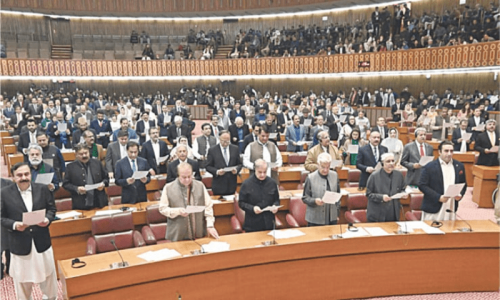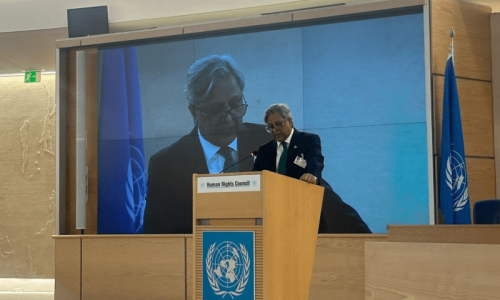JOHANNESBURG (South Africa): Zimbabwe’s rival political leaders failed again this week to break their deadlock over power-sharing, and hopes are dim that an emergency regional summit on the crisis will do any better.
The wrangling keeps politicians from grappling with Zimbabwe’s dizzying economic decline. That means more death from disease and hunger in a nation that once exported grain and boasted health, sanitation and education systems that were the envy of its neighbours in southern Africa.
Leaders of the Southern African Development Community nations will discuss the crisis on Monday, but they are unlikely to do more than make their usual call on Zimbabwean President Robert Mugabe and his main rival, Morgan Tsvangirai, to implement a power-sharing agreement stalled since September.
In their latest face-to-face meeting, Mugabe and Tsvangirai remained at an impasse after talks that stretched from Monday afternoon into the early hours of Tuesday. Since then, Zimbabwe’s factions have only hardened their stances.
Mugabe, in power since independence from Britain in 1980, says Tsvangirai should join him in a unity government and work out any reservations later. Tsvangirai refuses to enter a government before attacks on his supporters end and until he is assured members of his party will have an equal share of key cabinet seats and other government posts.
Zimbabwe has been virtually without a government since an inconclusive presidential election last March. The power-sharing deal was signed amid great fanfare and high expectations in September, but questions were raised almost immediately about whether it could work.
Some of Tsvangirai’s allies say he never should have agreed to serve as prime minister in a government that left Mugabe as president. Mugabe, meanwhile, is being held back by aides in the military and government who don’t want to give up power and prestige to the opposition.
Tsvangirai won more votes than Mugabe in the opening round of presidential balloting nearly a year ago, but he pulled out of a June runoff because of violence aimed at opposition supporters.
Tsvangirai has little reason to trust Mugabe, who is accused of overseeing Zimbabwe’s decline, trampling on democratic rights and killing opposition supporters.
Mugabe, who turns 85 next month, has shown little respect for Tsvangirai, calling him a puppet of the West and repeatedly pointing to the much younger union leader’s lack of experience fighting colonialism.
On Thursday, state media in Zimbabwe – the only source of news for many of the country’s people – repeated charges that Britain and the US want to invade to topple Mugabe and replace him with Tsvangirai.
The opposition says Mugabe is engaging in “hate speech” by trying to tie the president’s foes to white-ruled nations and has included stopping such rhetoric on a list of matters that must be addressed before it joins any unity government.
Tsvangirai, visiting a cholera clinic on Thursday, said he was sticking to his conditions. He said the regional leaders meeting Monday in Pretoria, South Africa, “should not be arm-twisted by Mugabe.”
It has become increasingly clear that the opposition believes the regional group has failed, largely because it refuses to publicly condemn Mugabe. The opposition wants the Zimbabwe issue handed over to others – perhaps the African Union or a special UN envoy.
The regional group itself could call for the AU to step in.
Neighbouring leaders have hinted they are losing patience with Mugabe, and a logical next step would be to move the discussion to the larger African forum. The AU has a summit in Ethiopia at the beginning of February, and Zimbabwean activists are already gathering in Addis Ababa.
Mugabe may not wait for the AU to weigh in, especially if he fears it will be more demanding of him than his immediate neighbours have been.
Mugabe could unilaterally name a government, freezing the opposition out of the cabinet. That would mean more impasse, because the opposition dominates parliament, and it could spark street protests.
The only certainty is more uncertainty – and more misery for ordinary Zimbabweans.—AP
















































